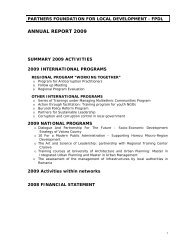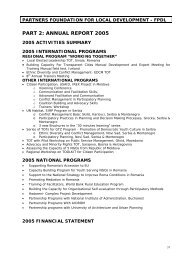Organizational Development: A Manual for Managers and ... - FPDL
Organizational Development: A Manual for Managers and ... - FPDL
Organizational Development: A Manual for Managers and ... - FPDL
You also want an ePaper? Increase the reach of your titles
YUMPU automatically turns print PDFs into web optimized ePapers that Google loves.
Chapter 2.5 Strategic Management<br />
Decline of the ‘traditional’ approach<br />
During the last half-century, the majestic term ‘strategic planning’ was so much in use by so many,<br />
that it finally got discredited, lost its sense <strong>and</strong> flavour <strong>and</strong> became an object of ridicule <strong>and</strong><br />
indignation - although not many significant undertakings were successful without a strategy <strong>and</strong><br />
plan.<br />
Since the criticism was mostly related to the ‘traditional view’ or the ‘Western approach’, it became<br />
fashionable in the West to talk about ‘re-defining strategy’ in a way that would make it effective <strong>for</strong><br />
today’s conditions. Neil Glass insists that “it must move from being a centrally developed detailed<br />
plan, cascading down to each operating level, to becoming a corporate direction or ambition that<br />
operational levels must refine <strong>and</strong> apply as best suits their individual circumstances.” (Glass, 1998)<br />
Edvin E. Olson <strong>and</strong> Glenda H. Eoyang think that, ‘The use of traditional planned change<br />
approaches, driven by leaders with the help of change facilitators, has fallen short even when<br />
bolstered by <strong>for</strong>mal (<strong>and</strong> expensive) programs such as TQM <strong>and</strong> re-engineering. The root of the<br />
problem has been the Newtonian legacy of organization-as-machine.” (Olson <strong>and</strong> Eoyang, 2001)<br />
No surprise that, based on the authors’ key assumption that “Individual or system behaviour is<br />
unknowable, unpredictable, <strong>and</strong> uncontrollable”, nothing remains <strong>for</strong> strategic planning - or <strong>for</strong><br />
management at all – the field of the battle is left to consultants… Nobody knows yet if the proposed<br />
new cure called CAS (Complex Adaptive Systems) will be less expensive than, let’s say, TQM. But<br />
it is good to see that the attention <strong>and</strong> respect given to the concept of self-organization is rising.<br />
Underst<strong>and</strong>ing the true order of things should also come one day.<br />
The East has not had much to do with a ‘re-defining strategy’, since the traditional Western<br />
approach had never been seriously rooted here as anything more than a <strong>for</strong>m of socialistic<br />
centralized planning, which had little to do with strategic thinking <strong>and</strong> was ab<strong>and</strong>oned two decades<br />
ago anyway. Since we have nothing to re-define, we will simply define what we mean by ‘strategy’<br />
<strong>and</strong> ‘strategic management’.<br />
Definition of strategic management<br />
With the respect to the Western roots of the discipline, let’s start from Wikipedia, <strong>and</strong> try to find out<br />
if strategic management, even in the Western sense, is truly gone.<br />
“The word ‘strategy’ derives from the Greek stratēgos, which referred to a 'military comm<strong>and</strong>er'<br />
during the age of Athenian Democracy. A strategy is typically an idea that distinguishes a course of<br />
140
















